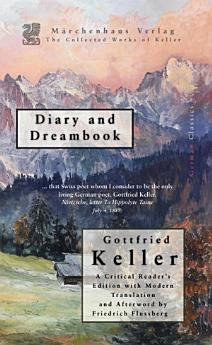Diary and Dreambook
May 2024 · Marchen Press
Ebook
92
Pages
family_home
Eligible
info
reportRatings and reviews aren’t verified Learn More
About this ebook
In 1838, when he was barely 20 years old, Heller stated that he felt that the independence of anyone who did not keep a diary was threatened, because "... this independence can only be preserved by constant reflection on oneself, and this is best done by keeping a diary". The poet himself did not adhere to this maxim for the rest of his life- in 1843, he kept a short diary that gives a deeper insight into the poet's life and work. In the Dream Book, which he kept from 1846, he recorded his dreams but also reflected on political events such as the revolutionary year of 1848. These two works are deeply intertwined, so they are presented in one volume. These two documents are a blend of introspective reflections, literary critiques, and vivid dream recollections. Keller's introspections reveal his philosophical and existential contemplations, while his critiques of literary figures like Hoffmann and Goethe highlight his engagement with contemporary intellectual currents. The dream sequences are rich and symbolic, offering a surreal counterpoint to the waking life detailed in the diary. These dreams, often blending with reality, reflect his innermost fears, desires, and unresolved conflicts, providing a window into his subconscious mind- a concept which the Zurich circle was starting to build out towards the end of Keller's life. This modern critical reader's translation from the original German includes supplementary materials that bring Keller's life and impact to life. Nietzsche considered Keller to be one of the greatest living poets of his time. However, his works are rarely found in other languages, so most people today are unaware of who he was or why he was important. This edition remedies that situation by providing a clear, accessible version of Keller's original German writing and offering insight into his broader ideas and the philosophical landscape in which he operated. Working directly from Keller's manuscripts, this new translation delivers literary excellence and scholarly depth with amplifying materials. Readers will discover not only Keller's powerful voice but also the philosophical currents that shaped an entire era of German thought. The edition includes an illuminating afterword tracing Keller's intellectual relationship with Nietzsche, revealing the fascinating dialogue between two of the period's most influential minds. A comprehensive timeline connects the major events of Keller's life with his published works, and a detailed index provides an authoritative guide to his complete writings. Together, these materials provide newcomers and serious readers with everything needed to appreciate one of literature's most overlooked figures.
About the author
One of Nietzsche's favorite living poets (the only real Swiss poet in his opinion, Keller was a major Swiss poet and writer, Keller is best known for his novel "Green Henry" (German: "Der grüne Heinrich"). His work is representative of the Realist movement, which sought to depict life and society as they were. Keller's stories often reflect the conflict between individual creative drives and the constraints of society. His novel "The People of Seldwyla" was one of Nietzsche's favorite.
Rate this ebook
Tell us what you think.
Reading information
Smartphones and tablets
Install the Google Play Books app for Android and iPad/iPhone. It syncs automatically with your account and allows you to read online or offline wherever you are.
Laptops and computers
You can listen to audiobooks purchased on Google Play using your computer's web browser.
eReaders and other devices
To read on e-ink devices like Kobo eReaders, you'll need to download a file and transfer it to your device. Follow the detailed Help Center instructions to transfer the files to supported eReaders.






